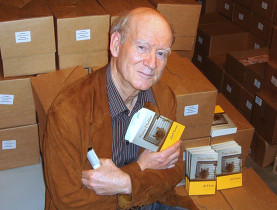
Read all about “the end of the world”

The tragic end of a feet-counting centipede, failed terrorists and crucified grandparents – there is no subject too strange, sacred or mundane for Franz Hohler.
A first English collection of the Swiss writer and performer’s works has just been published. It’s called At Home.
Hohler makes himself at home – rather appropriately – by sitting on top of a stack of boxes of his new book. We’re in the cellar of the English bookseller and publisher, Bergli Books, in Basel.
The storage area is a converted nuclear fallout shelter. It’s a quiet and inspirational place to chat with a man whose humour is often black, which is unusual for a Swiss-German performer.
“Everyday occurrences are theatre,” he quips while looking around the room. But it could also be queuing for a train ticket, visiting residents of an old people’s home or talking with grandparents:
“My grandmother told me once what she thought as a young girl of the death of Jesus Christ. To hang a few hours on the cross – that’s nothing, she thought. I have to go to the factory everyday.”
That’s how the short story, The Daily Death, begins. It tells of how Hohler’s grandmother stood up to the factory boss, and is typical of the rebellious nature, or fighting spirit, of many of the author’s characters.
There is also plenty of social commentary, environmental sensibility and self-deprecation in his writing. The latter – again – is not a normal Swiss characteristic.
Non-existence
In one story, he parodies the Swiss – himself included, who are quick to express their opinion but never like to admit to being wrong. In Destination Selzach, an Indian man wants to buy a train ticket to the place in the story’s title. The man has written the name down correctly but cannot pronounce it properly, prompting the woman behind the counter to announce that the place doesn’t exist.
Hohler, also queuing, butts in, in defence of the Indian to correct the ticket seller. Flustered, she produces the ticket while trying to blame the misunderstanding on the Indian.
“She wants to be right and hates to be wrong, but she was wrong and twists it to make it appear he was wrong. And I want to educate her,” Hohler explains. “We like to be perfect, that’s another Swiss attribute, I would say.”
Our interview complete, the writer confesses to having second thoughts about the translation of a couple of passages from stories he is to read from this evening.
Spilt milk
“Is ‘Halbrahm’ really single cream,” he asks? My own uncertainty about the translation does little to comfort him, but whether the cream is single or low fat, I feel it’s a little like crying over spilt milk.
But a little later in front of his audience, I discover Hohler needs to be a perfectionist on stage. It’s his ability to play with each word, each pause, using his sonorous voice to create tension and cause laughter to accentuate the absurdities of everyday life.
The highlight of the evening is the reading of a classic Hohler work, The End of the World. He chooses to read the original German while the English translator joins him in a duet.
It tells how the disappearance of a small beetle on a rather small island in the South Pacific is a sign that something is very wrong with the world’s ecological balance.
Loud beat
Hohler rhythmically taps his finger on the lectern during the entire story. The beat gets louder and more frantic as the end of the world nears.
He’s been performing the popular poem for more than 35 years – a long time for someone predicting that the end of the world is nigh.
I keep that thought to myself and ask the publisher why she chose to translate Hohler’s works.
“His message is universal, not just Swiss,” Dianne Dicks says. “He can take a simple children’s story that is quite profound. I was always fascinated by his work and long before I ever met him or got into publishing I had translated notes of his writings.”
Yet, his stories are very Swiss too. An assumption confirmed by Michael Köchlin, head of culture for Basel City canton, which provided funding for the English collection.
“I think if you read Franz Hohler, you understand a lot about Switzerland and the Swiss mentality. In this sense his book is like a small manual.”
The evening finishes with a book signing. Everyone in the audience it seems crowds to the front with a copy of Hohler’s book in hand. Many expats take the opportunity to tell Hohler how reading his stories has made them feel more at home in Switzerland.
swissinfo, Dale Bechtel in Basel
At Home, a selection of stories by Franz Hohler, is published by Bergli Books in Basel.
The 66-year-old artist lives in Zurich. He is the recipient of numerous awards in the German-speaking world.
Bergli Books publishes and promotes mostly English-language books that focus on life in Switzerland.

In compliance with the JTI standards
More: SWI swissinfo.ch certified by the Journalism Trust Initiative















![The four-metre-long painting "Sonntag der Bergbauern" [Sunday of the Mountain Farmers, 1923-24/26] had to be removed by a crane from the German Chancellery in Berlin for the exhibition in Bern.](https://www.swissinfo.ch/content/wp-content/uploads/sites/13/2025/12/01_Pressebild_KirchnerxKirchner.jpg?ver=a45b19f3)














You can find an overview of ongoing debates with our journalists here . Please join us!
If you want to start a conversation about a topic raised in this article or want to report factual errors, email us at english@swissinfo.ch.